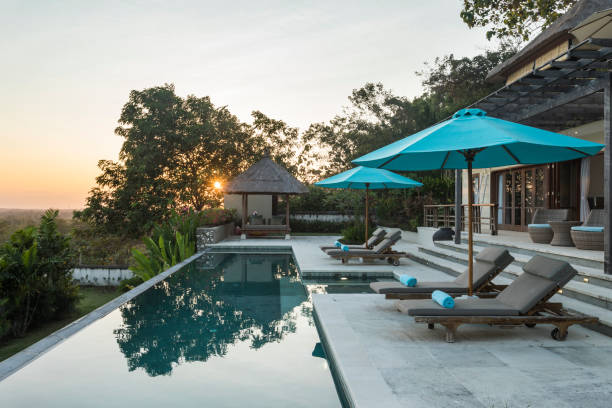Construction Legal Requirements for Bali Property Development



Property development in Bali has attracted both local and international investors for decades. With its growing tourism sector, cultural charm, and high return on investment potential, Bali is a top choice for building private villas, resorts, commercial spaces, and residential housing. However, navigating the legal landscape surrounding construction in Bali requires a clear understanding of the rules, regulations, and procedures involved.
As a trusted law service based in Bali, The Bali Lawyer provides complete legal assistance for individuals and businesses planning to develop property across the island. In this guide, we outline the essential construction legal requirements in Bali that every investor, developer, or property owner must understand before starting a building project.
Why Legal Compliance Is Crucial in Bali Property Development
Constructing a property in Bali without complying with Indonesian laws and local regulations can result in serious legal consequences, including:
Project delays
Financial penalties
Stop-work orders
Denial of utility services
Forced demolition
To ensure your project proceeds without issues, every step — from land acquisition to post-construction certification — must comply with the law.
Step-by-Step Legal Process for Property Development in Bali
1. Land Ownership and Usage Rights
Before construction can begin, the legal status of the land must be clearly verified. Foreigners are not allowed to own freehold land (Hak Milik) in Indonesia. However, legal alternatives include:
Hak Pakai (Right to Use): Common for individual foreigners.
Hak Guna Bangunan (Right to Build): Typically used by foreign-owned companies (PT PMA).
Lease Agreements: Long-term leases that allow property construction within permitted terms.
Always confirm that the land is free of disputes, registered properly with the National Land Agency (BPN), and matches the type of rights required for your intended use.
2. Zoning and Spatial Planning (Tata Ruang)
Zoning regulations determine whether the land can be used for residential, commercial, industrial, or tourism purposes. This is a critical step before design or construction begins.
You must obtain a Zoning Recommendation Letter (KRK) from the local spatial planning office, which outlines:
Permitted land use
Building height limits
Coverage and floor area ratios
Setback distances from roads, rivers, and neighbors
If the land is not zoned for the intended purpose, the building permit will be rejected.
3. Building Permit (PBG)
As of 2021, Indonesia replaced the IMB (Izin Mendirikan Bangunan) with the PBG (Persetujuan Bangunan Gedung)system.
The PBG confirms that your construction plans are legally approved and compliant with architectural, safety, and environmental standards.
Documents required for PBG:
Zoning Recommendation (KRK)
Land certificate and ID of the landowner
Architectural, structural, and MEP (Mechanical, Electrical, Plumbing) drawings
Drainage and sanitation plans
Soil test and environmental assessment
Statement of compliance with cultural and community regulations
Without a valid PBG, all construction is considered illegal and may face severe penalties.
4. Construction Supervision and Reporting
During construction, local government bodies may conduct inspections to ensure the project follows the approved plans submitted for the PBG.
It is the responsibility of the property owner and their professional team (architect, engineer, contractor) to:
Maintain accurate records of progress
Comply with environmental impact standards
Monitor safety regulations for workers and the public
Follow all guidelines outlined in the PBG approval
Any major deviation from the plan can result in delays or denial of your SLF (see next section).
5. SLF – Building Function Certificate
Upon completion of construction, you must obtain an SLF (Sertifikat Laik Fungsi) — a certificate confirming that the building is safe, compliant, and fit for use.
This certificate is required for:
Occupying the property
Registering utilities like electricity and water
Applying for a business license (if commercial)
Selling or leasing the property legally
The SLF process involves final inspections and evaluations by the local government.
Setback and Boundary Rules in Bali
Bali enforces strict setback rules to regulate the space between buildings and roads, rivers, and adjacent land. Common setbacks include:
5–10 meters from public roads
3 meters from neighboring property boundaries
More than 10 meters for beachfront or cliffside plots
These requirements vary depending on zoning and location. Violating setback rules can result in denial of permits or forced modifications to the structure.
Height and Density Restrictions
Most buildings in Bali must comply with height restrictions to preserve aesthetics, safety, and cultural standards.
Height Limit: Typically 15 meters, or about three stories
KDB (Building Coverage Ratio): Limits land area covered by the building
KLB (Floor Area Ratio): Controls how many floors can be built relative to the land size
Different regions and zones (especially near temples or heritage areas) may impose more stringent limitations.
Environmental and Cultural Considerations
Bali is unique due to its integration of spiritual, cultural, and environmental values into building laws.
Cultural Respect:
Do not build higher than nearby temples (Pura)
Maintain access for traditional ceremonies and processions
Avoid sacred areas or traditional village lands (Tanah Adat)
Environmental Protection:
Use proper wastewater management systems
Maintain natural drainage paths
Preserve trees and green space when possible
Avoid building too close to rivers, lakes, or the coastline
In certain zones, environmental impact assessments (AMDAL) or UKL-UPL reports are required before approval.
Nominee Arrangements and Legal Risks
Many foreign investors are tempted to use Indonesian citizens as “nominees” to hold land on their behalf. This approach carries substantial legal risks:
Foreign ownership through nominees is not legally protected
If a dispute arises, the foreigner has no legal claim over the property
Contracts or powers of attorney created to protect nominee deals can be voided
The safer and lawful approach is to use a Hak Pakai title, establish a PT PMA, or enter into a legally reviewed leasehold agreement. The Bali Lawyer can help you structure your investment securely and transparently.
Due Diligence Before You Build
Before purchasing land or starting construction, a thorough due diligence process should be completed. This includes:
Title verification and land certificate checks
Investigating encumbrances (e.g., mortgages, liens)
Zoning and land use eligibility
Physical survey and land measurement
Community or Banjar input if required
Failure to conduct proper due diligence is one of the most common causes of legal problems for property developers in Bali.
Common Mistakes to Avoid
Skipping zoning verification
Building before obtaining the PBG
Assuming foreign land ownership is protected under nominee deals
Ignoring height and setback rules
Failing to secure an SLF before occupancy
Underestimating cultural obligations and environmental impact
Every one of these mistakes can result in serious delays, financial loss, and legal complications.
The Role of The Bali Lawyer
At The Bali Lawyer, we offer comprehensive legal services for property development projects in Bali, including:
Land acquisition and due diligence
Legal structuring for foreign ownership
PT PMA establishment
Zoning and KRK application
PBG and SLF processing
Construction contract drafting
Permit verification and legal compliance checks
With years of experience in navigating Indonesia’s legal and property frameworks, we protect your investment while ensuring that your development meets all legal requirements.
Who Needs Legal Help with Construction in Bali?
You should seek professional legal support if:
You’re a foreigner planning to invest in Bali real estate
You’re building a villa, hotel, or commercial project
You need help understanding the PBG or SLF process
You’re unsure if the land is properly zoned for your plans
You want to ensure 100% legal compliance and documentation
Don’t take unnecessary risks with such a significant investment. Our team is here to support your success from the foundation up.
Bali offers incredible opportunities for property development, but the legal landscape must be understood and respected. From land acquisition and zoning to building permits and cultural regulations, every step must be legally compliant to ensure your project’s success.
At The Bali Lawyer, we are committed to guiding you through each phase of your property development journey. Whether you are developing a luxury villa, commercial space, or tourism venture, our experienced legal team provides reliable support every step of the way.
